by Grace Kunkel and Anthony Nearman
Grace’s Perspective (teaching/a few years of beekeeping experience)
On March 28th and 29th, our lab hosted its first ever Beginner’s Beekeeping Course at the University of Maryland. We had about 40 “students” in attendance as well as 16 “Bee Ambassadors,” who were experienced beekeepers we invited from many of the MD county clubs to give new students the opportunity to join a club for continued mentorship, answering questions that the students may have been hesitant to ask the instructors, and for help in getting bees.
Our goal for the course was to give everyone enough information they needed to start a colony and bring them through the first year. I think we did this fairly well, without overwhelming students with techniques and problems that don’t usually become an issue in the first year.
The course covered 17 different topics in the form of lectures, held in room 1101 of the Bioscience Research Building, a cavernous but very nice lecture hall. All of the attendees had such great questions throughout the lectures, which also ended up being a huge learning opportunity for the teachers.
On March 28th and 29th, our lab hosted its first ever Beginner’s Beekeeping Course at the University of Maryland. We had about 40 “students” in attendance as well as 16 “Bee Ambassadors,” who were experienced beekeepers we invited from many of the MD county clubs to give new students the opportunity to join a club for continued mentorship, answering questions that the students may have been hesitant to ask the instructors, and for help in getting bees.
Our goal for the course was to give everyone enough information they needed to start a colony and bring them through the first year. I think we did this fairly well, without overwhelming students with techniques and problems that don’t usually become an issue in the first year.
The course covered 17 different topics in the form of lectures, held in room 1101 of the Bioscience Research Building, a cavernous but very nice lecture hall. All of the attendees had such great questions throughout the lectures, which also ended up being a huge learning opportunity for the teachers.
We made sure there were plenty of breaks in the schedule to encourage mingling between students and ambassadors. We also had some hands on activities including breakout sessions for learning about colony equipment, safety equipment, and how to light a smoker.
These breakout sessions were one of the most popular parts of the class. In the future I think we would try to have even more hands on activities.
One activity in particular we could add is going through a live colony. This is definitely something we will include in the future when we get our teaching apiary established on campus.
One special thing we got to do was allow every member of our lab to attend the course free of charge. I will say that we ended up making them work for it because they helped immensely with making sure everything ran smoothly. This was a great opportunity because everyone in our lab has varying levels of experience in beekeeping. This course allowed us all to compare notes on what we knew and as well as learn more.
Anthony’s Perspective (newer to the lab, less beekeeping experience)
I’m the newest full time member of Dennis vanEngelsdorp’s lab and have very little exposure to beekeeping. In my short time here, I’ve had the privilege of being surrounded by people so knowledgeable that at times it can be pretty intimidating. I remember feeling ecstatic when the class was announced. I would get to experience their knowledge in a thoughtful, organized manor, bringing together what I was only able to glean from reading books, asking questions, and my short time on the job.
Day one of the class was electric. The excitement in the air reminded me of warm weather and new friends. Everyone wanted to be there and was ready to be a part of the weekend. It took a few minutes for the group to settle, but shortly after coffee and snacks the class began.
Introductory lectures done well are an amazing thing. Some information you know, some you don’t, but they don’t require so much focus that one has to abandon the anticipation of the experience and knowledge to come. They also provide a comfortable sense of where you are and where you’re going, which is a most welcome sentiment for just about anyone. In this, the instructors did a wonderful job and the bee ambassadors also presented themselves as knowledgeable and easy to approach.
As Grace mentioned, the highlight of the day was when we broke into small groups and got some hands on experience. Some people wanted to dive right in and handle the equipment being discussed. Others wanted to just observe or ask questions. Everyone appeared captivated. There was a great deal of chatting and laughing between group members as hive boxes were built, bee suits were put on, and smokers were puffed.
Day two was a bit more focused. Everyone had on their game faces for more detailed subjects like colony inspection, queens, and disease management. The mood did lighten, however, when Dennis caused an eruption of coffee beans in place of live honey bees during the sugar roll demonstration. Folks were also excited to see he used actual Varroa mites (no longer living), which had been collected from lab samples.
Both days were a wonderful success. A great deal of information was shared without being too overwhelming, which resulted in a tremendous amount of networking and learning. And let us not forget the copious and constant levels of refreshment throughout the event.
For more information on the class, click here.

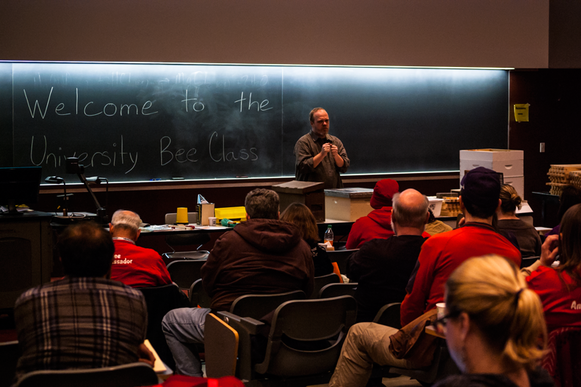
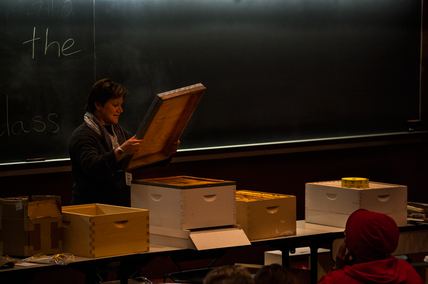

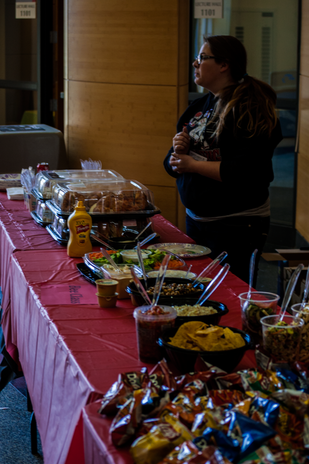
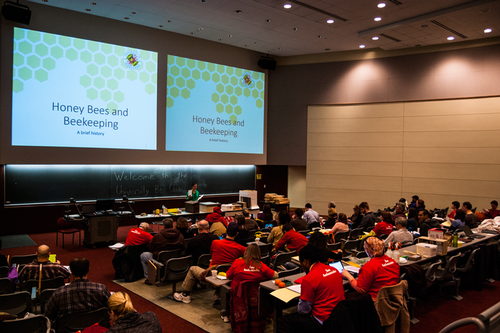
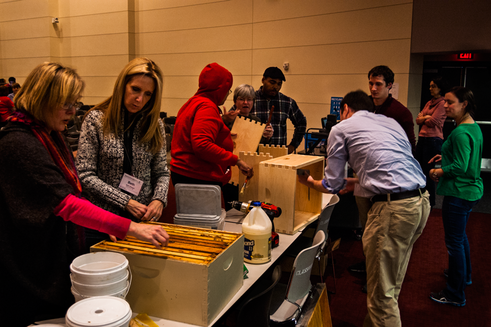
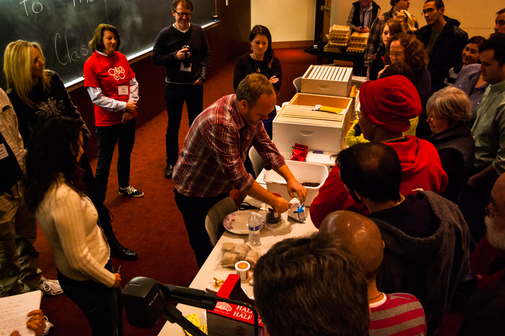
 RSS Feed
RSS Feed